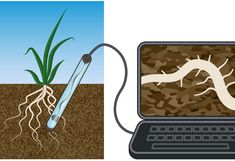Root Phenomics and Mechanomics
Research Interests
-

The minirhizotron system is a powerful tool for studying root growth and development in plants. Its non-destructive nature allows researchers to observe living roots in soil from season to season, while its high-resolution imaging capabilities enable tracking of root growth and hair outgrowth under natural growth conditions. The minirhizotron system has been used in many studies to investigate the effects of various environmental factors on root growth and development. (Pree et al. 2023 Frontiers in Plant Physiology)
Root growth is a very dynamic process and ever-changing aspect of plant development. Our research focuses on the improvement and development of innovative methods to monitor and quantify the dynamic growth patterns. We place a special emphasis on the early stages of root development, a time that is crucial for the overall health and stability of the plant. This period includes the establishment of seedlings and continues through to the plant’s adaptation to changing environmental stimuli. By improving our monitoring techniques, we aim to uncover new insights into how roots grow and respond to their environment.
For a comprehensive understanding of the cellular processes that drive root growth and adaptation, our research integrates detailed phenotyping data with a broad spectrum of studies in genetics, molecular biology, metabolomics, and transcriptomics. This multidisciplinary methodology enables us to explore the complex ways in which roots modify their growth to meet different environmental challenges. By merging data from direct observations with molecular-level analysis, we can pinpoint the specific genetic elements and biochemical routes that facilitate root adaptation. This approach offers a complete picture of plant resilience and vitality, essential for advancing our knowledge in plant science.
This knowledge could lead to stronger, more productive plants that can thrive in a variety of conditions. We aim to gain a comprehensive understanding of root systems, which is vital for improving seedling establishment and ensuring the success of plantations and restorations.
Phenotyping and Ecophysiology: A Comprehensive Approach to Understanding Organism-Environment Interactions
Overall Research Area
Understanding the complex interplay between organisms and their environment is a central challenge in ecological research. We apply key concepts and methodologies in phenotyping, and molecular ecophysiology, emphasizing their interconnectedness. By combining field studies, laboratory experiments, and molecular analyses, we aim to address challenges plants have to combat, specifically focusing on drought stress-mediated root growth adaptation.
Phenotyping and its Role in Ecological Research
Phenotyping, the measurement of observable traits, serves as a critical bridge between genotype and environment. By quantifying phenotypic variation, researchers can identify adaptive traits, understand ecological interactions, and evaluate organismal fitness. Integrating phenotyping with environmental data is essential for uncovering genotype-by-environment interactions and predicting responses to changing conditions.
Ongoing Projects
In the scope of an EU Horizon Project, BarleyMicroBreed, we evaluate in field and controlled experiments the potential of barley’s resistance to drought conditions by deciphering the symbiotic relationship between barley roots and their root microbiomes. We investigate if optimization of the interactions between plant roots and the soil’s native microbial communities can significantly improve the plant’s efficiency in utilizing resources and its resilience to drought. The overarching goals include identifying the connections between individual barley varieties and their associated root microbiomes that promote root traits essential for drought-resistant barley, and developing novel breeding strategies to benefit of indigenous soil microbial diversity.
The work is supported by the BarleyMicroBreed project, that has received funding from the European Union´s Horizon Europe research and innovation programme under Grant Agreement No. 101060057.
https://forschung.boku.ac.at/en/projects/14953
https://agro.au.dk/forskning/internationale-platforme/barleymicrobreed
Scientific publications
Pree S, Kashkan I and Retzer K. Dynamic Dark Root Chamber – Advancing non-invasive phenotyping of roots kept in darkness using infrared imaging. Preprint 2024 doi: https://doi.org/10.1101/2024.02.16.580252
Pree S, Malekian B, Sandén H, Nicolaisen M, Weckwerth W, Vestergård M, Retzer K. Deciphering the biological processes in root hairs required for N-self-fertilizing cereals. Front Plant Physiol [Internet]. 2023;1. Available from: https://www.frontiersin.org/articles/10.3389/fphgy.2023.1308534
Retzer K, Ibl V. Editorial: Highlights of the 2nd D(dark grown)-root meeting. Front Plant Sci. 2023 Jun 21;14:1227490. https://doi.org/10.3389/fpls.2023.1227490
